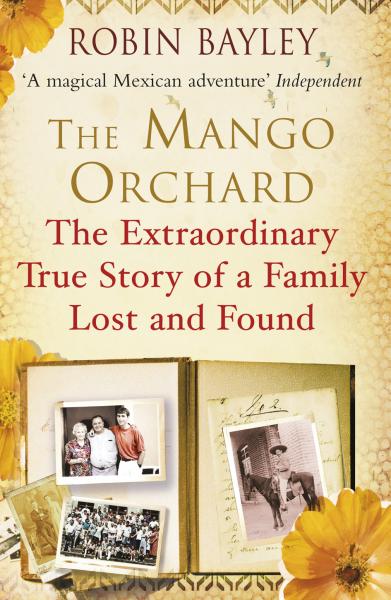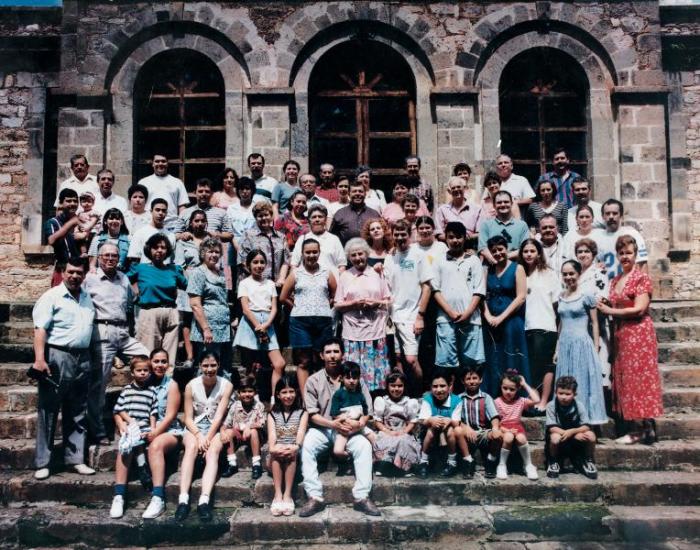My fascination with Latin America, and all things Mexican, can be traced back to the fabulous stories my grandmother told me as a child, about her father’s adventures in the Americas. She told me about gun fights, hidden bags of silver, scrapes with bandits and a narrow escape from the Mexican Revolution. There was though, something in the stories that to me seemed missing: an ending.
There are many different ways to write a book, and many different reasons for doing so. In my case, I wrote The Mango Orchard because I had no choice. For years, ever since I first heard my grandmother’s stories, I had felt that there would be something for me to find in Mexico. Rather than the memory of these stories fading as the years passed, their impact grew more intense and weighed more heavily on me. They gnawed at me until I could no longer ignore the inexplicable draw of Latin America and urge to put pen to paper. I resigned from my job, sold my flat and set out to see what my great grandfather had left behind.
When I began to write The Mango Orchard, I realised what an insanely optimistic journey I had undertaken. Not only did I have no idea what, if anything, my great grandfather had left behind, I also didn’t know exactly where he had been. All I knew was that the mango orchard, in which he had left the bags of silver for the bandit who saved his life, was outside a small village, near a small town, near Guadalajara. It wasn’t much to go on.
Like a method actor getting deep into the soul of the role he is playing, I immersed myself in the journey, trying to understand what it would have felt like for Arturo to embark on his journey with nothing other than a suitcase and a bag full of hope. I went to the Cunard pier in New York and tried to imagine stepping on to the continent of America for the first time. I flew to Guatemala, not just to get my Spanish up to speed, but to be able to appreciate what it would have been like to wake up every morning in a Latin American village.
Managing to cast myself adrift from the mindset of the TV executive I had once been, I began to trust my traveller’s intuition. I followed the road as it opened up to me, and found echoes of my great grandfather’s journey in my own, including encounters with the modern-day bandits: drug dealers and guerrilla fighters.
With the help of some additional clues from my grandmother who, now that I had arrived in Mexico had begun to recall more details of her father’s stories, I eventually tracked down the village where my great grandfather had lived and worked. It was a small village, near a small town, not very near to Guadalajara. There, I discovered that he had left a secret family behind, now numbering over three hundred. I also discovered that not only had he barely escaped the Mexican Revolution with his life, he had also played a part in starting it.
The following two weeks passed in a blur as I met the hundreds of people in my new-found family. Some thought I was the reincarnation of my great grandfather, coming back for them. Others were just pleased, if confused, that I had gone in search of something I didn’t know was there. All told me stories, which they had been told by their grandmother, that helped me piece together the missing parts of my great grandfather’s secret life.
When I arrived back in England, I had to reconcile my grandmother with my discovery. To her, it meant only one thing: that her father had been unfaithful to her mother. She couldn’t believe it, and suggested that this Mexican family had merely moved into his house and taken his surname. Just as she had told me stories when I was a boy, I now told stories to her. Bit by bit she came round. After six months she took me to one side and said, “I’ve been thinking about Mexico.”
“Oh yes?”
“Let’s go.”
A month after her 90th birthday, I took her to Mexico, where we were greeted by a mariachi fanfare and a sea of relatives, their faces bathed in tears. My great grandfather had finally come home.
It took me five years to write The Mango Orchard. It probably didn’t help that I am dyslexic and even if I can spell the words correctly, I will often initially write them in the wrong order. My grandmother, as she had been on my original journey, was my inspiration. Every time I saw her she would ask me how the book was coming on, and add, “Hurry up!”
When the book was finished, she read the completed manuscript twice. She died peacefully a few days after I told her that Random House had offered me an international publishing deal and that the book would be dedicated to her.
















